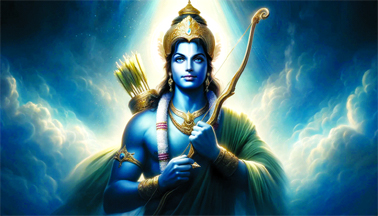Ram Navami is a joyous occasion celebrated by millions of people around the world. It marks the birth anniversary of Lord Rama, the seventh avatar of the Hindu deity Vishnu. This auspicious festival falls on the ninth day of the Chaitra month in the Hindu calendar, typically during the months of March or April. In 2024, Ram Navami falls on Wednesday, April 17th, is a day to remember Rama’s birth and celebrate the ideals he represents, it brings communities together to honor the beloved hero, Lord Rama. Let’s delve into this vibrant festival’s rich history, significance, and traditions.
The Birth and Legacy of Lord Rama
To truly appreciate Shree Ram Navami, we must first understand the captivating tale of Lord Rama. According to Hindu mythology, Lord Rama was born to King Dasharatha and Queen Kausalya in the ancient city of Ayodhya. His birth is believed to have occurred thousands of years ago, during the Treta Yuga, a time of great virtue and righteousness.
The story of Lord Rama’s life is chronicled in the epic Ramayana, written by the sage Valmiki. It narrates the journey of Rama, his wife Sita, and his loyal companion Hanuman, as they face numerous trials and tribulations. From his exile to the forests to his epic battle against the demon king Ravana, Lord Rama exemplifies courage, compassion, and devotion to righteousness.
Ram Navami marks the auspicious day when Lord Rama incarnated on earth to rid the world of evil and establish dharma, or righteousness. His life serves as an inspiration to millions, embodying the values of honor, sacrifice, and love for all beings.
Ram Navami Importance
Ram Navami holds immense significance in Hindu culture and spirituality. It symbolizes the victory of good over evil and the triumph of righteousness over injustice. Devotees believe that by observing this festival with devotion and piety, they can seek the blessings of Lord Rama for peace, prosperity, and spiritual growth.
For many, Ram Navami is not just a religious observance but a time for introspection and renewal of one’s commitment to leading a virtuous life. It serves as a reminder of the enduring values embodied by Lord Rama and the importance of upholding them in our daily lives.
Celebrations and Traditions
Ram Navami is celebrated with great fervor and devotion by Hindus worldwide. The festivities typically begin with devotees taking a holy bath before sunrise, followed by prayers and rituals dedicated to Lord Rama. Temples are adorned with flowers and lights, and special ceremonies are conducted to honor the deity.
One of the highlights of Ram Navami is the recitation of the Ramayana, the epic saga of Lord Rama’s life. Devotees gather in temples or community halls to listen to the enchanting tales of Rama, Sita, Hanuman, and other characters from the epic. The recitation is often accompanied by devotional songs and hymns praising the virtues of Lord Rama.
Another integral part of Ram Navami celebrations is the procession or ‘Rathayatra’ of Lord Rama. Idols or images of Lord Rama, along with his consort Sita, his loyal brother Lakshmana, and devotee Hanuman, are placed on elaborately decorated chariots and paraded through the streets amidst chanting of hymns and mantras. Devotees throng the streets to catch a glimpse of the divine procession and seek blessings from Lord Rama.
Feasting is an essential aspect of Ram Navami celebrations, with devotees preparing and sharing delicious vegetarian dishes as offerings to the deity. Special sweets like ‘Panakam’ (a sweet drink made of jaggery and spices) and ‘Neer mor’ (buttermilk) are prepared to mark the occasion. Sharing food with family, friends, and neighbors is believed to be a way of spreading joy and goodwill during the festival.
Ram Navami Significance and Symbolism
Ram Navami holds profound symbolism and significance in Hinduism. The birth of Lord Rama symbolizes the victory of righteousness and dharma over adharma (evil). It serves as a reminder of the importance of upholding moral values, respecting one’s duties and responsibilities, and standing up against injustice and tyranny.
The festival also signifies the beginning of spring, a season of renewal, growth, and prosperity. Just as the earth blossoms with new life during spring, Ram Navami rejuvenates the spirit of devotees, filling their hearts with hope, joy, and devotion.
Ram Navami also promotes unity and harmony among people of different communities and backgrounds. Regardless of caste, creed, or nationality, devotees come together to celebrate the universal ideals of love, compassion, and righteousness embodied by Lord Rama.
Teaching Lessons from Ram Navami
Ram Navami offers valuable lessons that can be imparted to students, fostering moral and spiritual development. Here are some teaching points inspired by the festival:
The Importance of Virtue: Ram Navami teaches students the significance of leading a virtuous life guided by principles of truth, compassion, and integrity, as exemplified by Lord Rama.
Resilience and Perseverance: The story of Lord Rama’s exile and his subsequent triumph over adversity teaches students the importance of resilience, perseverance, and determination in overcoming challenges.
Respect for Diversity: Ram Navami promotes inclusivity and respect for diversity, encouraging students to embrace people from different backgrounds and cultures with understanding and compassion.
Service and Sacrifice: The devotion of Hanuman and other characters in the Ramayana highlights the virtues of selfless service and sacrifice, inspiring students to contribute positively to society.
Upholding Dharma: Ram Navami emphasizes the importance of upholding dharma (righteousness) and fulfilling one’s duties and responsibilities with sincerity and dedication.
Ram Navami: Celebration of Lord Rama’s birth
